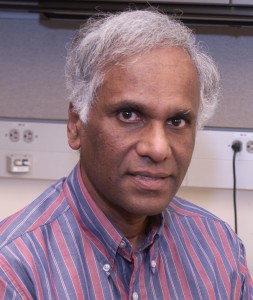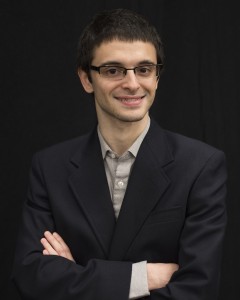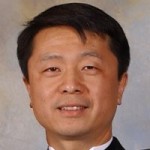Presenters:
- Professor Jacob Abraham, Cockrell Family Regents Chair in Engineering, University of Texas at Austin
 Show full Bio.Jacob Abraham (U Texas at Austin, USA) has been active in the area of test for forty years. He received his Ph.D. in Electrical Engineering and Computer Science from Stanford University in 1974. He was a faculty member at the University of Illinois in Urbana-Champaign from 1975 to 1988, where he developed the first high-level, “functional” fault models for memories and microprocessors, and showed that “coupling” faults between any pair of memory cells could be detected by an O(n) algorithm. He also invented the “algorithm-based fault tolerance” technique which uses information about the computation being performed to detect and correct errors due to faults.
Show full Bio.Jacob Abraham (U Texas at Austin, USA) has been active in the area of test for forty years. He received his Ph.D. in Electrical Engineering and Computer Science from Stanford University in 1974. He was a faculty member at the University of Illinois in Urbana-Champaign from 1975 to 1988, where he developed the first high-level, “functional” fault models for memories and microprocessors, and showed that “coupling” faults between any pair of memory cells could be detected by an O(n) algorithm. He also invented the “algorithm-based fault tolerance” technique which uses information about the computation being performed to detect and correct errors due to faults.Prof. Abraham has been at the University of Texas at Austin since 1988, where he holds an endowed chair in Engineering. At Texas, he devised a fault injection system, emulating hardware faults using software, to evaluate fault-tolerance capabilities of systems. He suggested the use of genetic algorithms for test generation, and developed the technique of “native-mode self-test” in which instruction sequences residing in memory are used as tests for faults in complex processors. He also developed techniques for testing analog/mixed-signal circuits and designs of on-chip circuits for facilitating the tests.
He has published extensively, has received many “best paper” awards, and is included in the ISI list of “highly-cited” researchers. He has supervised more than 90 Ph.D. dissertations and is particularly proud of the accomplishments of his students, many of whom hold senior positions in academia and industry. He has been elected Fellow of the IEEE as well as Fellow of the ACM, and is the recipient of the 2005 IEEE Emanuel R. Piore Award.
-
Dr. Hong Hao, Senior Vice Preisdent, Foundry BusinessSamsung Semiconductor Inc.Dr. Hong Hao has been Sr. Vice President of Foundry Business at Samsung AHQ (Americas Headquarters) in San Jose, California since July 2014. In this role, he is responsible for marketing, business development, sales, enablement ecosystem development, and customer engagement in North America. Prior to taking on his current role, Dr. Hao was Sr. Vice President of Samsung’s System LSI Bay Area R&D, focusing on high performance and highly power efficient SoC product development for the mobile and datacenter markets. He has more than 20 years of semiconductor industry experience in microprocessor, ASIC, SoC, Intellectual Property, and system product and technology development. He has led diverse teams in large multinational and Silicon Valley startup companies, and has established and executed many complex engineering and business engagements. His work experience prior to Samsung included progressively significant engineering, management and executive roles at Sun Microsystems, Silicon Graphics, NeoParadigm Labs, LSI Logic, and IntruGuard Devices. He has a Bachelor’s degree from the University of Science and Technology of China, and MS and PhD degrees from Stanford University.
- Mr. Max Shulaker, Stanford University
 Show full Bio.Max Shulaker is a PhD candidate in Electrical Engineering at Stanford University, under the supervision of Professor Subhasish Mitra and co-advised by Professor Philip Wong. He received his B.S. from Stanford University in Electrical Engineering. Max had the honor of interacting with and learning from Prof. McCluskey, as his academic grandchild. Max’s current research interests are in the broad area of nanosystems. His research results include the demonstration of the first carbon nanotube computer (highlighted on the cover of Nature, Sept. 2013), the first digital sub-systems built entirely using carbon nanotube FETs (awarded the ISSCC Jack Raper Award for Outstanding Technology-Directions Paper, 2013), the first monolithically-integrated 3D integrated circuits combining arbitrary vertical stacking of logic and memory (IEDM 2014), and the highest-performance CNFETs to-date (IEDM 2014). Max also enjoys teaching and has been a guest lecturer in several classes at Stanford. He is a Fannie and John Hertz Fellow and a Stanford Graduate Fellow. Starting Fall of 2016, Max will join the Electrical Engineering and Computer Science Department of MIT as an Assistant Professor.
Show full Bio.Max Shulaker is a PhD candidate in Electrical Engineering at Stanford University, under the supervision of Professor Subhasish Mitra and co-advised by Professor Philip Wong. He received his B.S. from Stanford University in Electrical Engineering. Max had the honor of interacting with and learning from Prof. McCluskey, as his academic grandchild. Max’s current research interests are in the broad area of nanosystems. His research results include the demonstration of the first carbon nanotube computer (highlighted on the cover of Nature, Sept. 2013), the first digital sub-systems built entirely using carbon nanotube FETs (awarded the ISSCC Jack Raper Award for Outstanding Technology-Directions Paper, 2013), the first monolithically-integrated 3D integrated circuits combining arbitrary vertical stacking of logic and memory (IEDM 2014), and the highest-performance CNFETs to-date (IEDM 2014). Max also enjoys teaching and has been a guest lecturer in several classes at Stanford. He is a Fannie and John Hertz Fellow and a Stanford Graduate Fellow. Starting Fall of 2016, Max will join the Electrical Engineering and Computer Science Department of MIT as an Assistant Professor.
Abstract: This second keynote is a tribute to the late Prof. E.J. McCluskey, entitled Digital revolution over Generations. This keynote is given by a panel of three prominent speakers belonging to three different generations, from senior to freshly-graduating. They will highlight the impact of Ed’s research on today’s challenges, and how they were inspired by him as they had to address these challenges. The three speakers are Professor Jacob Abraham, Cockrell Family Regents Chair in Engineering, University of Texas at Austin, Dr. Hong Hao, Senior Vice President, Samsung, and Mr. Max Shulaker, Stanford University.

